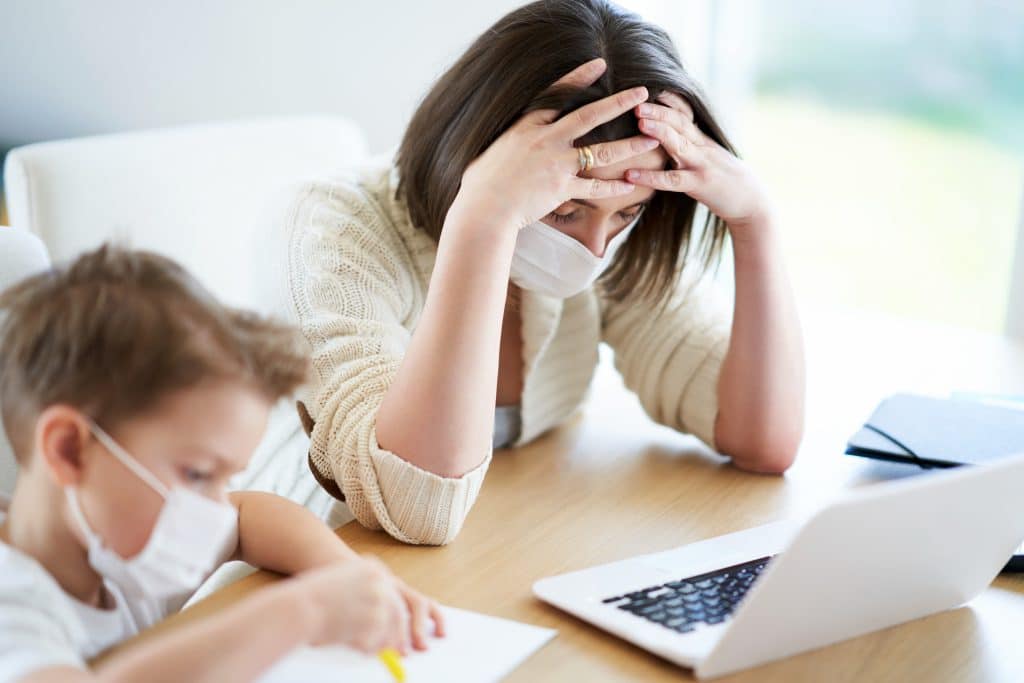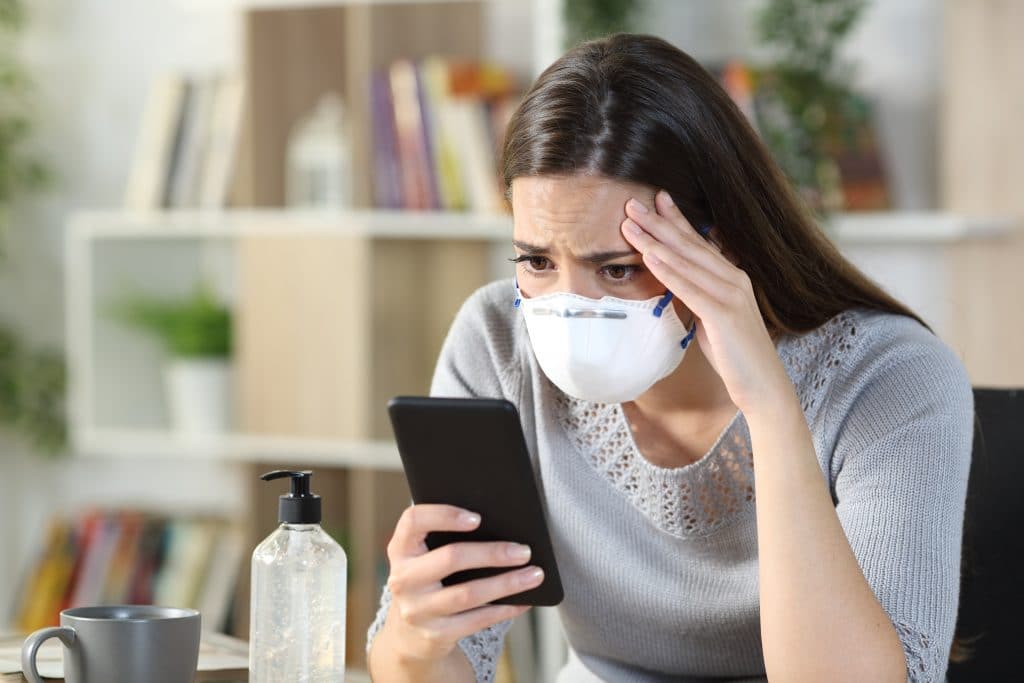
Have you seen or made jokes about having a “quarantini” during the coronavirus pandemic? During a pandemic, people can get stressed, which leads them to turn to substances for relief. If you’re in recovery, it can be even harder for you to resist the temptations of drugs and alcohol. This can make the addiction epidemic worse.
The proof is in the numbers: Nielsen reported that online alcohol sales increased by 500% at the end of April, and in-store sales increased by more than half in late March. One in 5 GenXers and 1 in 4 Millennials admit to drinking more since April 2020, near the beginning of the pandemic.
The reality is that addicts are at high risk for contracting this virus, and staying at home can cause or increase the addiction epidemic. Learn more about how these diseases interact with each other.
How Does COVID-19 Affect the Body?
SARS-CoV-2, which causes COVID-19, is a virus that targets the respiratory tract. Common symptoms of COVID include fever, trouble breathing, coughing, and a loss of taste and smell.
Most healthy people who contract the virus will have mild symptoms and recover from it. On the other hand, in older people and those with underlying conditions like cancer and diabetes, COVID-19 can be much worse. It can cause pneumonia, permanent lung damage, and severe acute respiratory syndrome (SARS). If you have an addiction, you most likely have a compromised immune system, which will make you more vulnerable to COVID-19.
Since this virus has only been around for a few months, there’s little we know about it. This is why everyone, including people with a substance use disorder, needs to follow safety guidelines provided by the Centers for Disease Control and Prevention (CDC).
Are Addicts More Likely to Get COVID-19?
Unfortunately, people who are part of the addiction epidemic are among those more at risk of getting COVID-19. This is because many of them have the following characteristics:
- They’re poor
- They are smokers with heart or lung disease
- They don’t have insurance or are under-insured
- They’re homeless
- They have health issues stemming from addiction
People in jail are also at high risk of getting COVID-19 since many of them have substance use disorders. Incarceration and homelessness put people closer together, making their likelihood of getting COVID-19 greater.
Disruption of Treatment Services
During a pandemic like this one, many treatment services are disrupted. Since people are told to stay at home, those who need drugs like methadone to treat the addiction epidemic can’t go to clinics. Even though the U.S. government has relaxed some restrictions for people who need medication, many people still can’t get what they need. “Stable” patients can get 14- or 28-day supplies of medication so that they don’t need to wait in line.
Opioid Use
Abusing opioids or taking them medically at high doses can also put you at risk for more serious coronavirus issues. Part of what opioids do is slow down your breathing, and this can cause hypoxemia, which is a large decrease of oxygen in the blood. If your brain doesn’t get enough oxygen, it can suffer some serious damage.
As a result of this lowered lung capacity due to opioids, your body can be in real danger if you contract COVID-19.
Methamphetamine Use
Since methamphetamine constricts the blood vessels, your body can suffer from pulmonary damage and hypertension (high blood pressure). This can pose problems for you if you get COVID-19.
How Does Social Isolation Increase The Addiction Epidemic?
There is a common belief in the recovery world that addiction is a “disease of isolation.” Although we must physically distance ourselves from each other during this pandemic, we shouldn’t “socially distance.” This means that we must stay in contact with our friends and family, now more than ever.
Social isolation can also increase the risk of overdose. It’s natural to feel anxious during a time when people are encouraged to stay home, social distance, and wear masks. If you’re doing drugs and you’re alone, there isn’t anyone who can call 911 if you overdose. Even if someone is around to call for help, many emergency rooms are filled with people suffering from COVID-19.
When you’re in recovery, you need social support. Physically distancing during the pandemic has made in-person support groups difficult. Many people in recovery depend on this. However, many of these support groups have gone virtual. Don’t let this deter you from keeping in touch with your fellow companions in recovery.
If you know someone who has a substance use disorder, now is a good time to reach out and see how they’re doing. Connect them to resources that can help, such as virtual support groups. Encourage them to pursue activities that boost their mental health, like exercise or meditation.
Stigma Isn’t Helping
There are also reports of police officers across the U.S. refusing to give naloxone to people who have overdosed. Officers are afraid that if they recover, they’ll sneeze and possibly spread COVID-19 through droplets.
Outsiders who observe an overdose happening might not be willing to perform CPR on someone for this same reason. People are afraid to contract COVID-19, so they might be less willing to help. This is detrimental to people who need naloxone during an overdose.
How to Prevent Addiction During COVID-19
You might be tempted to turn to drugs or alcohol while in quarantine. This time can be the ultimate trigger for many people in recovery. However, there are many things you can do while staying home to prevent falling back into the pitfalls of the addiction epidemic.
Take Care of Your Mental Health
If you’re having an emergency, call 911. There are hotlines you can call if you’re having suicidal thoughts and need someone to talk to. Many therapists are also holding virtual telehealth conferences on video chat platforms. Set aside a good time for an appointment.
Here is a list of hotlines you can contact:

- National Suicide Prevention Lifeline: 988
- Disaster Distress Helpline: 800-985-5990. Also text TalkWithUs to 66746.
- National Domestic Violence Hotline: 800-799-7233. Also text LOVEIS to 22522.
- National Sexual Assault Hotline: 800-655-4673
- Veterans Crisis Line: 800-273-8255. Also text 8388255 to this number.
The Substance Abuse and Mental Health Services Administration (SAMHSA) also has a behavioral health treatment services locator on their website. This is helpful for people who have underlying disorders besides addiction, including depression and bipolar disorder.
As always, reach out to friends and family you can trust for support. They’re willing to help you in your times of need. If you’re in recovery, enroll in online support groups so that you can remain connected during this time.
Be Active
Meditate, exercise, or practice yoga while you’re at home. If you’ve never done yoga, you can find plenty of video tutorials online. Being active helps clear your mind and will make your brain release endorphins, which make you happy.
Get Plenty of Sleep
Enough sleep is the key to staying mentally healthy. If you get less than six hours of sleep, you’ll be less likely to be able to fight off diseases like COVID-19. Lack of sleep can also lead to more long-term conditions like heart disease and diabetes.
Eat Healthy
You might want to reach for a bag of chips or some chocolate when you’re staying at home all the time. Although this is the easy choice, eating healthy will keep your brain and body healthy.
Overall, while you’re in quarantine you should do what makes you happy and positively affects your mental health. When you take care of yourself and become aware of triggers, you have a better chance of avoiding addiction.
What Should I Do If I’m An Addict During the Pandemic?
If you’re already suffering from substance use disorder at this time, there are a couple of things you should do. Call your doctor if you’re feeling any symptoms of COVID-19. Keep physically distancing, and wear a mask when you can’t. Follow all safety guidelines from the CDC.
Those who are currently in treatment for substance use disorder should stay in contact with their treatment provider. Some facilities are changing their protocol due to the virus, so make sure to stay on top of these changes.
Get Treatment for Addiction at Harmony Ridge
Harmony Ridge Recovery Center is accepting patients during this time. Even in times of crisis, we are here for you if you need help. We offer several treatment options that are tailored to your needs, including detox, intensive outpatient treatment, partial hospitalization, and residential treatment. Depending on the severity of your addiction, you might be better suited for one treatment over another.
Therapy is also necessary for recovery, as it helps change the way you think about drugs and alcohol. It will provide you with coping strategies that will stay with you long after the COVID-19 pandemic is over.
If you’re suffering from the addiction epidemic during the coronavirus pandemic, it’s especially important that you get treatment now. Contact us today to speak with one of our representatives. See what we can do for you. Don’t wait!
References:




